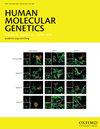在 MECP2 重复综合征人 iPSC 衍生神经元中模拟反义寡核苷酸疗法,揭示与 MeCP2 水平相关的基因表达程序
IF 3.1
2区 生物学
Q3 BIOCHEMISTRY & MOLECULAR BIOLOGY
引用次数: 0
摘要
可导致神经发育障碍的基因组拷贝数变异(CNV)通常包含许多基因,这使我们对 CNV 中的单个基因如何导致病理的理解变得更加复杂。MECP2重复综合征(MDS或OMIM中的MRXSL;OMIM#300260)就是这样一种由跨越甲基CpG结合蛋白2(MECP2)和Xq28上其他基因的重复引起的CNV疾病。使用反义寡核苷酸 (ASO) 使 MECP2 的剂量正常化,就足以挽救单独过表达 MECP2 的小鼠模型的异常神经表型,这说明了在 Xq28 的 CNV 中 MECP2 剂量增加的重要性。然而,由于 MDS CNV 跨 MECP2 和其他基因,我们从多个 MDS 患者衍生的诱导多能细胞 (iPSC) 中生成了人类神经元,以评估在 MDS 人类神经元背景下使用抗 MECP2 的 ASO 的益处。重要的是,我们发现了一个基因特征,该特征在ASO处理后会发生部分定性调节,并确定了对MeCP2功能敏感的基因,以及在Rett综合征模型中发生改变的基因,Rett综合征是一种由MeCP2功能缺失引起的神经系统疾病。此外,该特征包含的基因在MeCP2耗竭时会在未受影响的对照组人类神经元中发生异常改变,从而揭示了人类神经元中对MeCP2水平定性敏感的基因表达程序。最后,ASO 治疗可部分挽救 MDS 神经元的异常神经元形态。总之,这些数据证明,靶向 MECP2 的 ASO 对人类 MDS 神经元有益。此外,我们的研究还建立了一个范例,用于评估 CNV 中单个基因对发病机制的贡献,并评估其作为治疗靶点的潜力。本文章由计算机程序翻译,如有差异,请以英文原文为准。
Modeling antisense oligonucleotide therapy in MECP2 duplication syndrome human iPSC-derived neurons reveals gene expression programs responsive to MeCP2 levels
Genomic copy-number variations (CNVs) that can cause neurodevelopmental disorders often encompass many genes, which complicates our understanding of how individual genes within a CNV contribute to pathology. MECP2 duplication syndrome (MDS or MRXSL in OMIM; OMIM#300260) is one such CNV disorder caused by duplications spanning methyl CpG-binding protein 2 (MECP2) and other genes on Xq28. Using an antisense oligonucleotide (ASO) to normalize MECP2 dosage is sufficient to rescue abnormal neurological phenotypes in mouse models overexpressing MECP2 alone, implicating the importance of increased MECP2 dosage within CNVs of Xq28. However, because MDS CNVs span MECP2 and additional genes, we generated human neurons from multiple MDS patient-derived induced pluripotent cells (iPSCs) to evaluate the benefit of using an ASO against MECP2 in a MDS human neuronal context. Importantly, we identified a signature of genes that is partially and qualitatively modulated upon ASO treatment, pinpointed genes sensitive to MeCP2 function, and altered in a model of Rett syndrome, a neurological disorder caused by loss of MeCP2 function. Furthermore, the signature contained genes that are aberrantly altered in unaffected control human neurons upon MeCP2 depletion, revealing gene expression programs qualitatively sensitive to MeCP2 levels in human neurons. Lastly, ASO treatment led to a partial rescue of abnormal neuronal morphology in MDS neurons. All together, these data demonstrate that ASOs targeting MECP2 benefit human MDS neurons. Moreover, our study establishes a paradigm by which to evaluate the contribution of individual genes within a CNV to pathogenesis and to assess their potential as a therapeutic target.
求助全文
通过发布文献求助,成功后即可免费获取论文全文。
去求助
来源期刊

Human molecular genetics
生物-生化与分子生物学
CiteScore
6.90
自引率
2.90%
发文量
294
审稿时长
2-4 weeks
期刊介绍:
Human Molecular Genetics concentrates on full-length research papers covering a wide range of topics in all aspects of human molecular genetics. These include:
the molecular basis of human genetic disease
developmental genetics
cancer genetics
neurogenetics
chromosome and genome structure and function
therapy of genetic disease
stem cells in human genetic disease and therapy, including the application of iPS cells
genome-wide association studies
mouse and other models of human diseases
functional genomics
computational genomics
In addition, the journal also publishes research on other model systems for the analysis of genes, especially when there is an obvious relevance to human genetics.
 求助内容:
求助内容: 应助结果提醒方式:
应助结果提醒方式:


